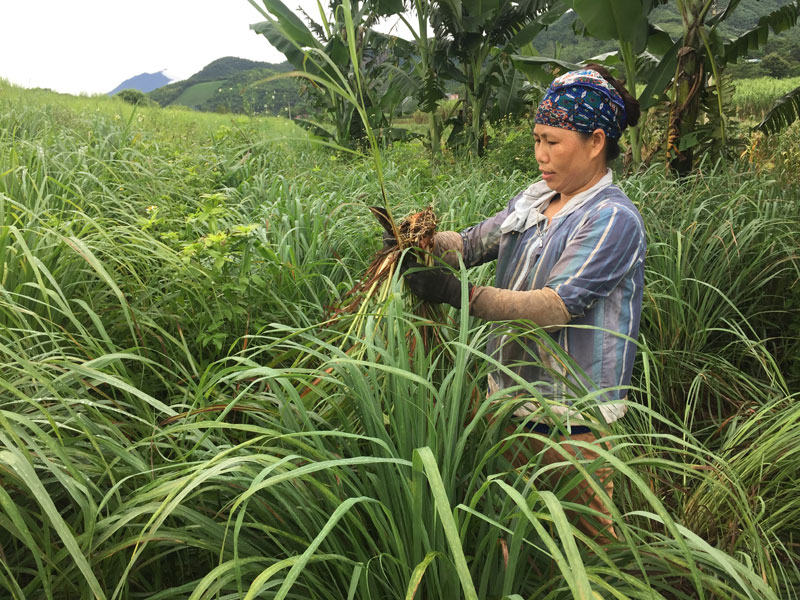
(HBO) - where there is vacant land, there is lemongrass. Up to now, lemongrass is not the key crop to help people in Phuc Tien commune (Ky Son) get rich. However, lemongrass has helped people improve their income much. This is the confirmation of Mr. Nguyen Cuong Bien, the Vice Chairman of Phuc Tien Commune People's Committee when sharing about local models of planting lemongrass in the local area.

Ms. Dinh Thi Lan’s family in Doan Ket 2
village, Phuc Tien Commune (Ky Son) has improved their income thanks to
planting lemongrass.
As far as being concern, lemongrass was
planted by some households in the commune from 1997 or 1998. This is a healthy plant, which
requires little care and it is suitable for local climate and soil. In recent
years, the price of lemongrass ranged from 5,000 to 7,000 VND / kg. However, at
the time of before Tet traditional occasion, it can be up to 12,000 VND / kg.
Therefore, in recent years, many households have made use of garden land,
converting land for lemongrass cultivation in hopes of raising their income.
According to statistics, the area of lemongrass plantation in the commune has
expanded to 80 hectares. Most households maintain the area of between 2,000 and
5,000 square meters. However, some households have expanded the area to nearly
2 hectares, such as the families of Mr. Dinh Manh Huong, Mr. Dinh Cong Phon in
Doan Ket 1village, etc.
We visited Mr. Dinh Manh Huong's family in
Doan Ket 1 Village. At present, the area of lemongrass planting of Mr.
Huong’s family expanded to 1.4 hectares. In 2017, his family exported 7 tons of
lemongrass to the market, earning over 70 million VND. Mr. Huong said: My
family has planted lemongrass for 5-6 years. In my opinion, this is a suitable
variety for our local land. Although growers do not take too much care, they
still collect products throughout the year. If they know how to exploit
correctly, 1 hectare of lemongrass can bring the profit of more than 100
million VND per year. Meanwhile, with the same area, the growers can only gain
about 60 million VND after deducting costs if they plant rice.
Ms. Dinh Thi Lan, in Doan Ket 2 village,
said: "The economy of my family is mainly based on agricultural
production. However, when realizing the economic effect of lemongrass, the family
has converted about 700 m2 of land from growing rice to lemongrass. When the
farmers are crop free, the members of the family focus on harvesting
lemongrass, it is estimated that each person can earn about 250,000 VND per
day. In comparison with growing sugarcane, growing lemongrass is less
hardworking but more profitable.
Dao Village’s honey – a product certified with a 3-star OCOP (One Commune One Product) rating by Thong Nhat Agricultural Cooperative in Dao Village (Hoa Binh City) – is highly regarded by consumers for its quality, richness, and variety in packaging. The distinctively sweet taste of Dao Village’s honey leaves a lasting impression on anyone who has tried it.
In alignment with Project No. 07-DA/TU, issued by the Hoa Binh provincial Party Committee on November 1, 2021, Lac Thuy district has actively promoted investment and supported the sustainable development of its industrial and handicraft sectors during the 2021–2025 period. Alongside this, the district has remained committed to preserving and revitalising traditional craft villages.
Located in the northern part of Lac Thuy district, with a temperate climate and fertile soil, Phu Thanh commune has great potential and advantages in growing tea. The long-standing experience, combined with strict adherence to organic farming practices in the tea gardens, ensures that the dried tea products from Phu Thanh and Lac Thuy as a whole are sold out immediately upon production, providing a stable and prosperous life for the local people.
Amid efforts to streamline the administrative apparatus, Hoa Binh province has intensified measures to address challenges in land clearance, resettlement support, and infrastructure investment, aiming to speed up the progress of key projects.
Hoa Binh province has posted an unprecedented economic growth rate of 12.76% in the first quarter of 2025, marking its highest quarterly performance to date and positioning it as the second fastest-growing locality in the country, trailing only Bac Giang province.
Under current regulations, products in the One Commune – One Product (OCOP) programme that are rated three stars or higher must undergo re-evaluation every three months. However, in reality, some of these products fail to consistently meet the required standards, raising concerns about the sustainability of their OCOP certification. This underscores the urgent need for producers to enhance product quality and gradually develop their OCOP products into strong, marketable brands.



